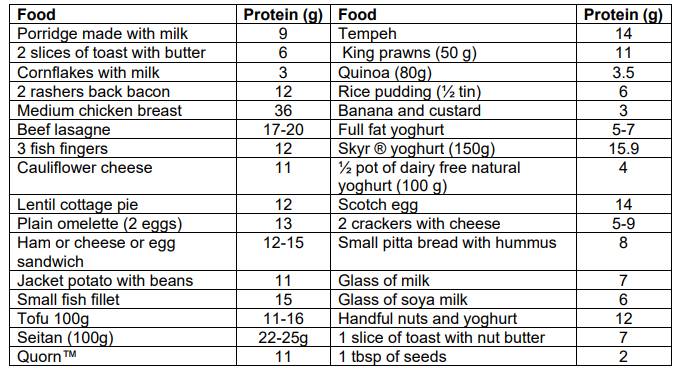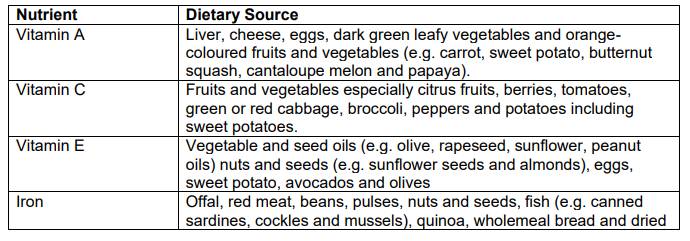Wound Healing – Dietary advice
Please note, this page is printable by selecting the normal print options on your computer.
Good nutrition is essential to help with wound healing and pressure ulcer management.
A well-balanced diet plays an important role in improving your immune system, to protect you against infection and to reduce the time it takes for wounds to heal. If you have a wound, your body’s requirement for some nutrients is increased. In particular you should ensure that you have adequate vitamins and minerals in your diet, you may also need extra protein to heal wounds. You can get all the nutrients you need for wound healing from eating a variety of foods from all the food groups and drinking plenty of fluid.
Protein
Protein is necessary for the growth and repair of all tissues including muscle and skin. You may need to increase the amount of protein in your diet to help with wound healing, as your requirements for protein are higher at this time. This is particularly true if you have multiple wounds, or your wounds are weeping fluid.
Good dietary sources of protein include:
• Meat, including poultry, fish, and shellfish
• Eggs
• Milk and milk products such as cheese, yoghurt, and custard
• Meat alternatives such as Quorn™ and seitan (wheat gluten)
• Soya and soya products like tofu, tempeh, and fortified soya drinks
• Beans, lentils, and chickpeas
• Grains ( bulgur, and oatmeal)
• Nuts and nut butters
• Seeds
Try to have a protein source at each meal and include high protein snacks between meals. Examples of meal, pudding, and snack options, with their protein content are as follows:

Tips for increasing protein in your meals:
• Add diced meat, fish, eggs, beans to soups, salads, and casseroles
• Fortify milk with dried milk powder and use on cereal, in hot drinks, and recipes, such as scrambled eggs, mashed potato and sauces
• Choosing desserts that contain eggs or milk such as sponge cake, custard, or bread pudding.
Micronutrients – Vitamins and Minerals
A number of vitamins and minerals contribute towards wound healing, therefore it is important to eat a variety of foods to get all the vitamins and minerals you need within your diet. The following table gives details of the vitamins and minerals that play a key role in wound healing, as well as their dietary sources.


A good guide to aim for is ‘5-A-DAY’ of a variety of fruits and vegetables, as well as including protein sources as discussed above. You should continue to base your meals on starchy foods such as potatoes, breads, pasta, rice, noodles or cereals. Choose high fibre or wholegrain varieties as much as possible as these usually contain more fibre, vitamins and minerals.
If you are unable to eat a variety of these foods regularly, you may need to take a multi-vitamin and mineral supplement. However, if you are managing to eat a varied diet then you are unlikely to need a multi-vitamin or mineral supplements, as it may not be beneficial and in some cases, can be harmful.
Fluid
Dehydrated skin can become dry and fragile. Being well hydrated is important to keep skin supple and allow good blood flow to the tissues.
In order to maintain good hydration aim to:
• You should aim for 1.5 to 2 litres per day (6-10 cups/mugs). Suitable fluids include water, squash, fruit juices, milk, milk alternatives, and soups. It also includes hot drinks, such as tea, coffee, and hot chocolate You will also get some fluid from the foods you eat, especially fruit and vegetables, sauces and gravies; and puddings such as ice cream or jelly.
• Reduce caffeinated drinks if you consume more than 3 cups per day (more than this may start to have a dehydrating effect).
• Stay within recommended limits for alcohol consumption (no more than 14 units per week). Alcohol may make your body pass more urine than usual and make you dehydrated, and would not contribute towards your fluid intake.
If you are overweight…
Carrying extra body weight can slow healing of wounds. However, it is not appropriate to follow a restrictive low energy diet as this could compromise wound healing. The aim should be to maintain your current weight until your wounds have healed.
If you are underweight…
If you are underweight or you have lost a lot of weight unintentionally, you may not have enough nutrient stores in your body. Without nutrients the healing process may take longer. If you find you are struggling with your appetite, the following tips may help:
• Try eating little and often if you struggle to manage a full portion size at mealtimes – aim for 3 small meals and 2-3 snacks, or milky drinks per day.
• Aim to have extra 2- 3 snacks throughout the day e.g. nuts, cheese and crackers, avocado, Greek or Skyr ® yogurt, nut butter.
• Include nourishing puddings after your meals such as rice pudding, trifle, sponge and custard, ice cream, and yoghurt.
• Have nourishing drinks such as hot milky drinks, full fat milk, milkshakes, fruit juice, and creamy soups in between meals.
• Enrich the food you do eat by adding extra grated cheese, custard, milk powder, condensed milk, butter, cream, salad cream, mayonnaise, olive oil, avocado, ground nuts or nut butter.
• Add extra sauces and gravies to meat, chicken, and fish.
• Your dietitian may suggest a prescription of nutritional supplement drinks to help you meet your nutritional requirements.
For more advice on improving your nutritional intake, ask your dietitian for a ‘Food first as treatment for under-nutrition’ leaflet.
If you have diabetes…
If you have diabetes or high blood sugar, continue to monitor your blood sugar levels closely. Having good control of blood sugar levels will help with wound healing and may prevent
infection.
